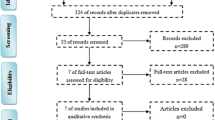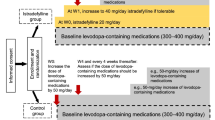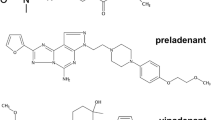Abstract
Istradefylline, a selective adenosine A2A receptor antagonist, has recently been approved for the treatment of ‘off’ episodes in patients with Parkinson’s disease (PD) who are already receiving treatment with levodopa/carbidopa. The aim of the article is to review the efficacy, safety and tolerability of istradefylline in the management of ‘off’ episodes of PD, based on English language articles on this topic indexed in PubMed or in the National Institute of Health clinical trials registry during 2003–2019. Based on the beneficial outcomes of phase 2 or 3 clinical trials and a post-marketing surveillance study in Japan, istradefylline is a promising option for treating ‘off’ episodes in PD patients already receiving levodopa/carbidopa. The important adverse effects observed in the clinical trials were dyskinesia and hallucination. Head-to-head clinical trials are required to compare the efficacy of istradefylline with other classes of drugs, so as to ascertain its relative efficacy in managing the ‘off’ phase of PD.
Similar content being viewed by others
References
Tysnes OB, Storstein A. Epidemiology of Parkinson’s disease. J Neural Transm. 2017;124(8):901–5.
Kinoshita KI, Tada Y, Muroi Y, et al. Selective loss of dopaminergic neurons in the substantia nigra pars compacta after systemic administration of MPTP facilitates extinction learning. Life Sci. 2015;137:28–36.
Ganguly U, Chakrabarti SS, Kaur U, et al. Alpha-synuclein, proteotoxicity and Parkinson's disease: search for neuroprotective therapy. Curr Neuropharmacol. 2018;16(7):1086–97.
Khan TS. Off spells and dyskinesias: pharmacologic management of motor complications. Clevel Clin J Med. 2012;79(Suppl 2):S8–S13.
Aquino CC, Fox SH. Clinical spectrum of levodopa-induced complications. Mov Disord. 2015;30(1):80–9.
Chou KL, Stacy M, Simuni T, et al. The spectrum of “off” in Parkinson’s disease: what have we learned over 40 years? Park Relat Disord. 2018;51:9–16.
Calabresi P, Ghiglieri V, Mazzocchetti P, et al. Levodopa-induced plasticity: a double-edged sword in Parkinson's disease? Philos Trans R Soc. 2015;370(1672):20140184.
Nazario LR, da Silva RS, Bonan CD. Targeting adenosine signaling in Parkinson’s disease: from pharmacological to non-pharmacological approaches. Front Neurosci. 2017;11:658.
Svenningsson P, Hall H, Sedvall G, et al. Distribution of adenosine receptors in the postmortem human brain: an extended autoradiographic study. Synapse. 1997;27(4):322–35.
Fink JS, Weaver DR, Rivkees SA, et al. Molecular cloning of the rat A2 adenosine receptor: selective co-expression with D2 dopamine receptors in rat striatum. Mol Brain Res. 1992;14(3):186–95.
Pollack AE, Fink JS. Adenosine antagonists potentiate D2 dopamine-dependent activation of Fos in the striatopallidal pathway. Neuroscience. 1995;68(3):721–8.
Soliman AM, Fathalla AM, Moustafa AA. Adenosine role in brain functions: pathophysiological influence on Parkinson’s disease and other brain disorders. Pharmacol Rep. 2018;70(4):661–7.
Dungo R, Deeks ED. Istradefylline: first global approval. Drugs. 2013;73(8):875–82.
FDA approves new add-on drug to treat off episodes in adults with Parkinson’s disease [media release]. 2019. https://www.fda.gov/news-events/press-announcements/fda-approves-new-add-drug-treat-episodes-adults-parkinsons-disease. Accessed 28 Feb 2020.
Rao N, Uchimura T, Mori A. Evaluation of safety, tolerability, and multiple-dose pharmacokinetics of istradefylline in Parkinson's disease patients [abstract no. PIII-88]. Clin Pharmacol Ther. 2008;83(Suppl 1):S99.
Highlights of prescribing information [Nourianz™ (istradefylline)] https://www.accessdata.fda.gov/drugsatfda_docs/label/2019/022075s000lbl.pdf. Accessed 28 Feb 2020.
Mukai M, Uchimura T, Zhang X, et al. Effects of rifampin on the pharmacokinetics of a single dose of istradefylline in healthy subjects. J Clin Pharmacol. 2018;58(2):193–201.
Rao N, Dvorchik B, Sussman N, et al. A study of the pharmacokinetic interaction of istradefylline, a novel therapeutic for Parkinson’s disease, and atorvastatin. J Clin Pharmacol. 2008;48(9):1092–8.
LeWitt PA, Guttman M, Tetrud JW, et al. Adenosine A2A receptor antagonist istradefylline (KW-6002) reduces off time in Parkinson’s disease: a double-blind, randomized, multicenter clinical trial (6002-US-005). Ann Neurol. 2008;63(3):295–3020.
Mizuno Y, Hasegawa K, Kondo T, et al. Clinical efficacy of istradefylline (KW-6002) in Parkinson’s disease: a randomized, controlled study. Mov Disord. 2010;25(10):1437–43.
Mizuno Y, Kondo T. Adenosine A2A receptor antagonist istradefylline reduces daily OFF time in Parkinson’s disease. Mov Disord. 2013;28(8):1138–41.
Hauser RA, Shulman LM, Trugman JM, et al. Study of istradefylline in patients with Parkinson’s disease on levodopa with motor fluctuations. Mov Disord. 2008;23(15):2177–85.
Pourcher E, Fernandez HH, Stacy M, et al. Istradefylline for Parkinson's disease patients experiencing motor fluctuations: results of the KW-6002-US-018 study. Parkinsonism Relat Disord. 2012;18(2):178–84.
Takahashi M, Fujita M, Asai N, et al. Safety and effectiveness of istradefylline in patients with Parkinson’s disease: interim analysis of a post-marketing surveillance study in Japan. Expert Opin Pharmacother. 2018;19(15):1635–42.
Pappert EJ, DeGruyther N, Agro A. Treatment of OFF episodes in Parkinson’s disease: an evaluation of patient and caregiver insights [abstract no. 837]. Mov Disord. 2016;31(Suppl 2). https://www.mdsabstracts.org/abstract/treatment-of-off-episodes-in-parkinsons-disease-an-evaluation-of-patient-and-caregiver-insights/. Accessed 16 Mar 2020.
Poewe WH, Deuschl G, Gordin A, et al. Efficacy and safety of entacapone in Parkinson’s disease patients with suboptimal levodopa response: a 6-month randomized placebo controlled double blind study in Germany and Austria (Celomen study). Acta Neurol Scand. 2002;105(4):245–55.
Schwid SR. A randomized placebo-controlled trial of rasagiline in levodopa-treated patients with Parkinson disease and motor fluctuations: the PRESTO study. Arch Neurol. 2005;62(2):241–8.
Rascol O, Brooks DJ, Melamed E, et al. Rasagiline as an adjunct to levodopa in patients with Parkinson’s disease and motor fluctuations (LARGO, Lasting effect in Adjunct therapy with Rasagiline Given Once daily, study): a randomised, double-blind, parallel-group trial. Lancet. 2005;365(9463):947–54.
Robertson ED. Treatment of central nervous system degenerative disorders. In: Brunton L, Knollmann B, Hilal-Dandan R, editors. Goodman and Gilman’s the pharmacological basis of therapeutics. 13th ed. New York: McGraw Hill; 2018. p. 327–338.
Vorovenci RJ, Antonini A. The efficacy of oral adenosine A2A antagonist istradefylline for the treatment of moderate to severe Parkinson’s disease. Expert Rev Neurother. 2015;15(12):1383–90.
Author information
Authors and Affiliations
Contributions
All authors contributed equally.
Corresponding author
Ethics declarations
Funding
No funding received from any source.
Conflict of interest
Nothing to disclose.
Rights and permissions
About this article
Cite this article
Sahoo, A.K., Gupta, D. & Singh, A. Istradefylline: a novel drug for ‘off’ episodes in Parkinson’s disease. Drugs Ther Perspect 36, 208–212 (2020). https://doi.org/10.1007/s40267-020-00718-w
Published:
Issue Date:
DOI: https://doi.org/10.1007/s40267-020-00718-w




